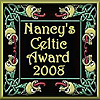| |

Traditions, folklore, history and more. If it's Irish, it's here. Or will be!
"People will not look forward to posterity who never look backward to their ancestors."
-Edmund Burke




Quotes
Library: Books, Movies, Music
Prints & Photos
Poetry
Jokes


Shops Ireland
Bunús na Gaeilge
(Basic Irish)
Circle of Prayer
Blessings
Did You Know?
Himself/Herself
Write to Us
Readers Write..
Links/Link to Us
Advertise with us
Awards & Testimonials
Submissions Guide


|
|
|
The Bees Who would not be Left Behind
by Bridget Haggerty
 Before the establishment of the great Irish monasteries, there lived a young man named Modomnoc who was a descendant of the royal line of O'Neil. He wanted to be a priest and so he left Ireland and went to be educated under the great Saint David at Mynyw (Menevia, now Saint David's) Monastery in Wales. All those who resided in the community were expected to share in the manual work as well as the study and worship; Modomnoc was given charge of the bees and he loved it. He cared for them tenderly, keeping them in straw skeps in a special sheltered corner of the garden, where he planted the kinds of flowers the bees loved best. Before the establishment of the great Irish monasteries, there lived a young man named Modomnoc who was a descendant of the royal line of O'Neil. He wanted to be a priest and so he left Ireland and went to be educated under the great Saint David at Mynyw (Menevia, now Saint David's) Monastery in Wales. All those who resided in the community were expected to share in the manual work as well as the study and worship; Modomnoc was given charge of the bees and he loved it. He cared for them tenderly, keeping them in straw skeps in a special sheltered corner of the garden, where he planted the kinds of flowers the bees loved best.
Every time they swarmed, he captured the swarm very gently and lovingly and set up yet another hive. He talked to the bees as he worked among them and they buzzed around his head in clouds. It was as if they were responding to his soothing words.
At the end of summer, they gave him a surfeit of honey — so much that Modomnoc needed help carrying it into the monastery. Thanks to Modomnoc and his bees, the monks never ran out of honey for their meals or for making mead - their favorite beverage.
The good Modomnoc thanked God for this, and he also thanked the bees. He would walk among the skeps in the evening and talk to them, and the bees would come out to meet him. All the other monks carefully avoided that corner of the monastery garden because they were afraid of being stung. But the bees never stung Modomnoc.

Soon his years of study ended, and Modomnoc had to return to Ireland to begin his priestly ministry. While he was glad to be returning home, he knew he would miss his bees. On the day of his departure, he said good-bye to the Abbot, the monks, and his fellow students. Then he went down to the garden to bid his little friends farewell.
They came out in the hundreds of thousands in answer to his voice and never was there such a buzzing and excitement among the rows and rows of hives. The monks stood at a distance watching the commotion in wonder, "You'd think the bees knew," they said. "You'd think they knew that Modomnoc was going away."
Modomnoc resolutely turned, went down to the shore, and boarded the ship. When they were about three miles from the shore, Modomnoc saw what looked like a little black cloud in the sky in the direction of the Welsh coast. He watched it curiously and as it came closer, he saw to his amazement that it was a swarm of bees. It was a gigantic swarm - all the bees from all the hives in the monastery garden had followed him!
They settled on the boat near Modomnoc who was very unhappy with his friends. "How foolish of you," he scolded them, "you do not belong to me but to the monastery! How do you suppose the monks can do without honey for their meals or honey-wine to drink? Go back at once, you foolish creatures!" But if the bees understood what he said, they did not obey him. They settled down with a sleepy kind of murmur, and there they stayed. The sailors did not like it and demanded of Modomnoc what he intended to do.
He told the sailors to turn the boat back for Wales. It was already too far for the bees to fly back, even if they wanted to obey him. He could not allow his little friends to suffer for their foolishness. But the wind was blowing the boat to Ireland and when they turned back, the sail was useless. The sailors had to furl it and row back to the Welsh coast. They were furious but were too much afraid of the bees to do otherwise.
The abbott and the monks were very surprised to see a somewhat embarrassed Modomnoc coming back. As he explained what happened, the bees made straight for their hives and settled down. "Wait until tomorrow," advised the abbot, "but don't say goodbye to the bees. They will be over the parting by then."
Next morning, the boat was again in readiness for Modomnoc and this time he left hurriedly without any fuss of farewell. But, when they were about three miles from the shore, he was dismayed to see that little black cloud rising up over the Welsh coast The sailors turned back to shore immediately.
Once more, Modomnoc had to seek out the abbot and tell him what happened. "What am I to do?" he pleaded. "I must go home. The bees won't let me go without them - but I can't deprive you of them. They are too valuable to the monastery."
The abbott said, "Modomnoc, I give you the bees. Take them with my blessing. I am certain they would not thrive without you. Take them. We'll get other bees for the monastery."
The abbot went down to the boat and talked with the sailors. "If the bees follow Modomnoc for the third time, take them to Ireland with him and my blessing." But it took a long time and a great deal of persuasion to get the sailors to agree to this arrangement. The abbot assured the sailors that the bees would give them no trouble as long as Modomnoc was on board.
For the third time the boat set sail and Modomnoc prayed fervently that the bees would have the sense to stay in their pleasant garden rather than risk their lives at sea. But, for the third time, he saw the black cloud rise over the coast of Wales. This time the boat did not turn back. Resigned to the will of God and the persistence of his faithful friends, he coaxed the swarm into a sheltered corner of the boat. There, much to the relief of the sailors, they quietly remained throughout the voyage.
When he landed in Ireland, Modomnoc set up a church at Bremore, near Balbriggan in Co.Dublin. Here, he established the bees in a pleasant garden similar to the one in Wales. To this day, the place is known as "the Church of the Beekeeper."
Sources: This story and many others gathered from The Book of Saints ( Macmillan); Twenty Tales of Irish Saints by A. Curtayne (Sheed and Ward); The Oxford Dictionary of Saints, by D.H. Farmer (Oxford University Press); The Glorious Company: Lives of Great Christians for Daily Devotion, vol. I. by F. C. Gill, (Epworth Press); For All the Saints web site; and Celtic Orthodox Christianity web site.
Image: Bee Skep with Frog from All posters and Prints.
|
|
Fri, Sep 27, 2024
 The Galway Hooker The Galway Hooker
This unique vessel, with its distinctive curved lines and bright red sails, originated in the village of Claddagh. During the 19th century, hookers supported a significant fishing industry and also carried goods, livestock and fuel. Seán Rainey is remembered for building the last of the original boats, the Truelight, for Martin Oliver who was to become the last king of the Claddagh; as king, he was entitled to white sails on his boat. Since the mid seventies, many of the old sailing craft which were on the verge of extinction have been lovingly restored and new ones have been built. During the summer months they can be seen at festivals such a Cruinniú na mBád - the Gathering of the Boats - in Kinvara.
Click for More Culture Corner.
A fascinating, very cleverly written account that's part fiction and part fact. But don't be misled by the "fiction" part. The stories that Mr. Moorhouse tells are all based on thoroughly researched historical evidence. Bridget Haggerty
"Moorhouse writes with eloquence and a quiet humor calculated to charm even the blackest of heathens." Atlantic Monthly
"The chilling facts of the monks' penitent lives are real enough to send a shiver down an Irish Catholic's spine." New York Times Book Review
Click here for Sun Dancing.
|
Illustrated with designs from the Book of Kells and other Celtic and Irish designs, the prayers reflect a profound view of nature and life. I strongly recommend this to pastors or lay people with any interest in Celtic culture. Edited from an Amazon review
Click here for Celtic Prayers.v
|
|
|
|
|




 The Galway Hooker
The Galway Hooker